Project Name: The Clatterbridge Cancer Centre Melanoma Service Development Joint Working Project
Joint Working Project Summary:
Clatterbridge Cancer Centre (CCC) provides cancer care for a patient population of 2.3 million across Cheshire and Merseyside.
The service currently manages 1025 melanoma patients, with activity growing at approximately 10% every year and an expected incidence of 212 new metastatic melanoma patients alone in 2019. In addition, Clatterbridge is one of 2 cancer centres in the UK to manage ocular melanoma serving 150 patients locally. This ocular melanoma service saw an increase in activity by more than 50% from 2016 – 2017 which leaves significantly less time to focus on the metastatic melanoma patient population.
This joint working project (JWP) aims to support the development of the melanoma service across Cheshire and Merseyside by resourcing a part-time Clinical Nurse Specialist (CNS). The provision of a CNS would improve the melanoma service by increasing the resources available to metastatic melanoma patients.
The JWP would enable provision of a dedicated CNS-led clinic and CNS-led telephone clinic within the current clinic framework. As a result of the additional resources provided through this JWP, patients would be stratified to different models of care depending on their needs and would receive support to ensure optimal management of their condition alongside education on their disease and treatment options. The CNS will also provide education for healthcare professionals involved in the care of melanoma patients.
Expected Patient Outcomes for this Project:
The expected outcomes of this project are to:
- ensure equitable access to and improved care for melanoma patients across the Cheshire and Merseyside catchment area (improved patient care through stratifying patients into different models of care that better reflect the patient needs);
- enhance patient experience by creating a nurse-led melanoma clinic and telephone clinic to ensure provision of education to patients on their disease, treatment choices, outcomes and goals, in addition to standard care;
- improve the education of melanoma healthcare professionals with respect to the disease area, treatments and new developments, both within the new expanded clinic by additional training and externally sharing best practice with other melanoma teams in other hospitals;
- capture and analyse patient service satisfaction questionnaire data and service database and clinic data to demonstrate how the improved service is benefitting patients and that the new and expanded clinics will be financially sustainable for the Trust.
Start Date & Duration: March 2019 – November 2021 (32 months)
UK | March 2021 | 182272
Project Name: The Clatterbridge Cancer Centre Melanoma Service Development Joint Working Project
Partner Organisation(s): Clatterbridge Cancer Centre NHS Foundation Trust
Completion Date: November 2021
Outcome Summary:
Melanoma service improvement at Clatterbridge Cancer Centre (and its referring hospitals) through the provision of a dedicated Clinical Nurse Specialist (“CNS”) led clinic, CNS-led telephone and ad-hoc clinic during the pandemic, which resulted in improved care of patients with a diagnosis of melanoma and enhanced education for their healthcare practitioners.
Key Project Outcomes Data:
Creation and development of two CNS clinics (1 face:face and 1 telephone) in addition to a CNS stream in the main consultant clinic, providing a multidisciplinary approach to consultations with the goal of freeing up consultant capacity. Once the patients were initially reviewed by the consultants and consented for treatment with adjuvant therapy, the subsequent consultations were delivered by the CNS. The face:face clinic took the form of an adjuvant medication review clinic whilst the telephone clinic took the form of holistic needs assessment. In addition, during the pandemic, an ad-hoc clinic was also established as a result of patients treated with BRAF mutation targeted therapy experiencing possible side effects e.g. pyrexia who were triaged to the CNS via A&E.
Outcomes:
This project was impacted by the COVID-19 pandemic and the move of the Cancer Centre from Clatterbridge to Liverpool. Adjustments had to be made for the safety and wellbeing of patients and staff.
Patient Experience
A patient survey was completed at timely intervals about the overall change to the service. The eleven-month survey was not completed as planned in June 2020 due to COVID-19, instead a snapshot was taken in October 2021. Analysis of the results was conducted after each survey and recommendations given, allowing the service to develop and be responsive to the needs of the patient- also highlighting any operational concerns. At the month 5 survey, the following recommendations were made and put into action within the service:
- All new patients to meet a member of the team i.e. CNS/Advance Nurse Practitioner/Cancer Support Worker and be provided with contact details on the initial appointment with the team.
- Contact cards to be introduced for the service.
- Where possible a member of the team will be allocated to check for messages when not office based.
- Information will need to be provided to patients about the move (to Liverpool Cancer Centre) and the potential impact on accessibility over phone.
- Improve numbers of patients surveyed for month 11.
Whilst numbers are smaller from the baseline survey (when a side by side comparison is made) it does, however, still show an improvement in patient satisfaction with regards to a number of the listed recommendations.

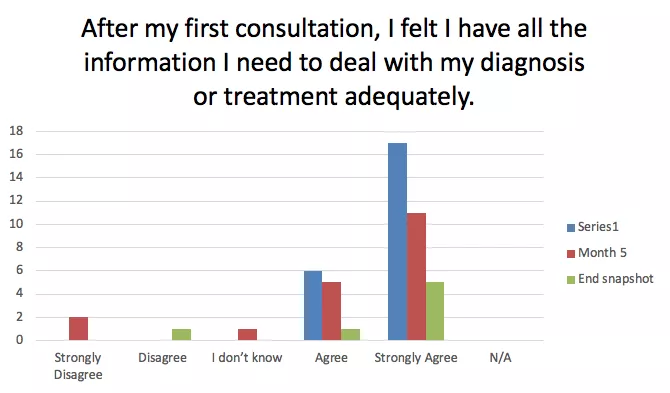
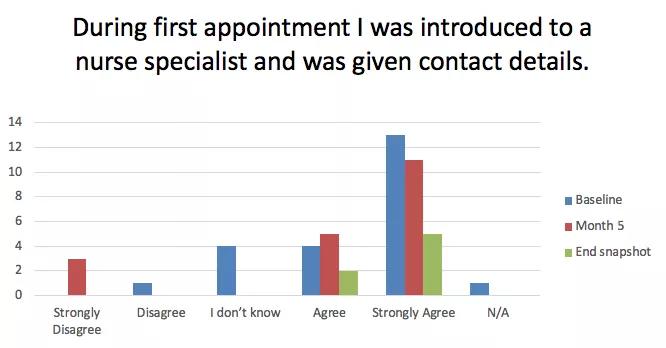
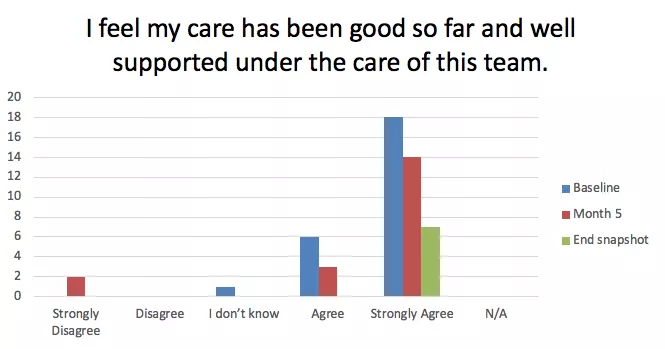
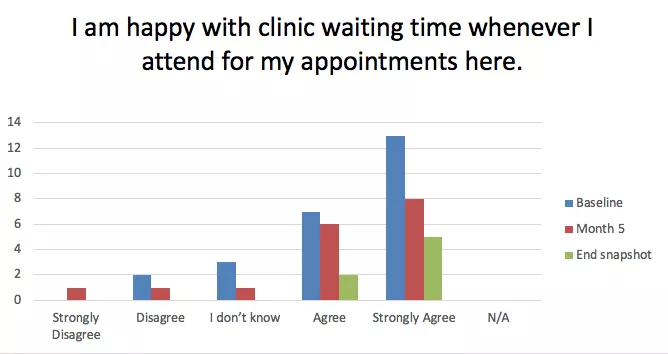
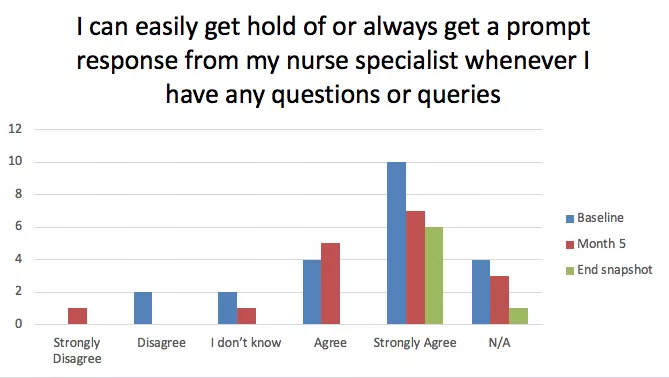
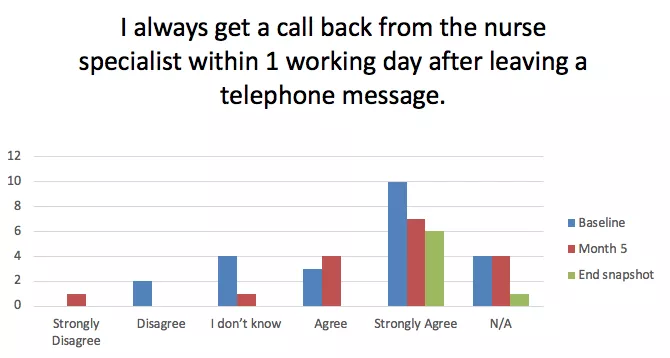
Face:Face Adjuvant CNS Clinic
Despite the impact of COVID-19, there was an increase in the number of patients reviewed by the CNS (and therefore increased capacity freed up for consultant time) in the adjuvant clinic from an average of 6 patients per month (Oct ‘19-Sep ‘20) to 19 patients per month (Oct ’20- Sep ’21).
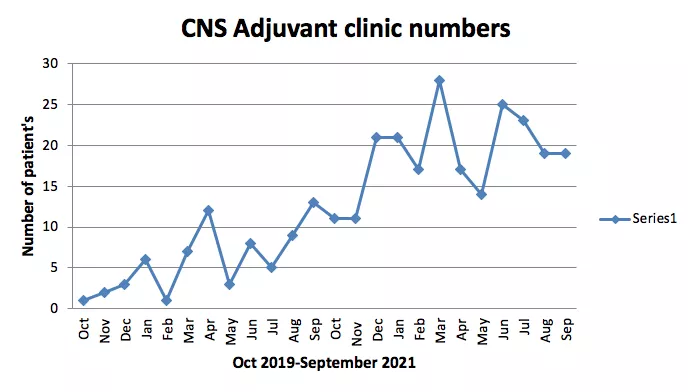
Telephone Support Clinic
The sharp increase in calls from March to May 2020 reflects the team’s proactive response to the COVID-19 pandemic, ensuring greater support (especially to more vulnerable patients) with patients being contacted more frequently. This allowed close monitoring of patients toxicity from treatment and to implement any required interventions in the community, helping to reduce the risk of patients having to attend or be admitted to hospital. Months with reduced numbers of calls reflects the reduction in staff capacity due to absence and July-September numbers were reduced due to a member of the team retiring.
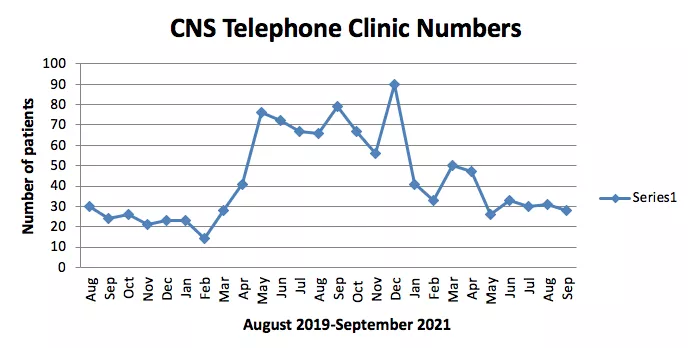
Ad-hoc CNS Clinic
This allowed the CNS to assess patients and determine if treatment needed to be withheld or continued and enabled the avoidance of unnecessary hospital attendances.
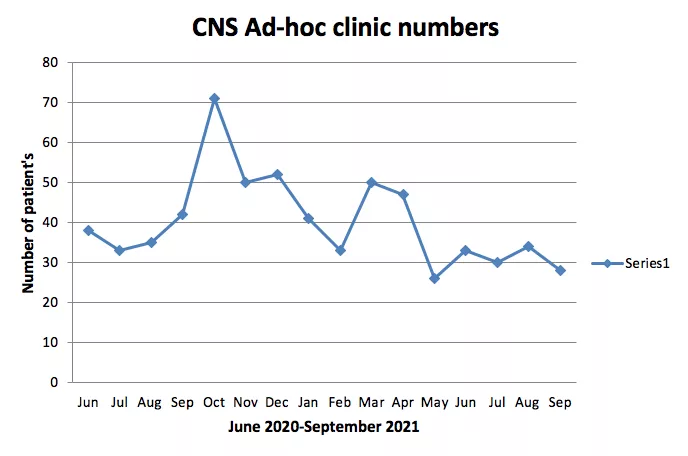
Reduction in inappropriate calls to the CNS team
The CNS has increased the number of patient’s reviewed on a monthly basis. In addition, there was a reduction in the number of of inappropriate calls to the CNS and almost all messages that were received were responded to within 24 hours. Whilst there was an increase from month 11 to month 24 this can be put down to increasing patient numbers.
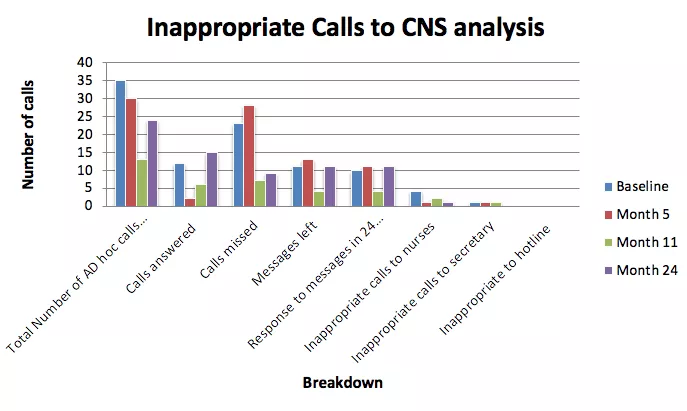
Educational Updates
Education events about disease specific knowledge and treatment options for melanoma patients took place both internally (on-treatment radiographers meeting, 2x ward staff in-patient meetings) and externally on a regional and national level (North West Haematology Network meeting, North West Skin Cancer Alliance meeting, North West Regional meeting and a speaking slot at the ‘Cancers and their Management’ course). In addition to education being provided to others, role specific training was also undertaken in the form of master modules including clinical examinations and clinical diagnostics.
Quote From Partner:
“The project allowed an in depth look at the skin service and provided valuable insight into areas that required improvement. A large proportion of it was undertaken during COVID which required us to adapt to the ever changing environment. Some of the changes introduced due to COVID have helped to develop the service as it is now. With the knowledge gained from the project along with the new patient clinics we are now able to support a larger number of patients. Overall the service has improved significantly and this is felt by both patients and staff.”
- Stephanie Riddick, Skin cancer trainee ANP, The Clatterbridge Cancer Centre NHS Foundation Trust
Conclusion:
Based on the successful implementation of the CNS clinics, the positive impact on patients and the overall service, funding was secured (without the need to produce a business case) for the continuation of the role of the CNS within Clatterbridge Cancer Centre NHS Foundation Trust. The joint working partnership has allowed the Nurse led melanoma service to grow and develop. It has also provided much needed increased support to the medical team. The service will continue to develop going forward now the project has completed.
UK2208020829